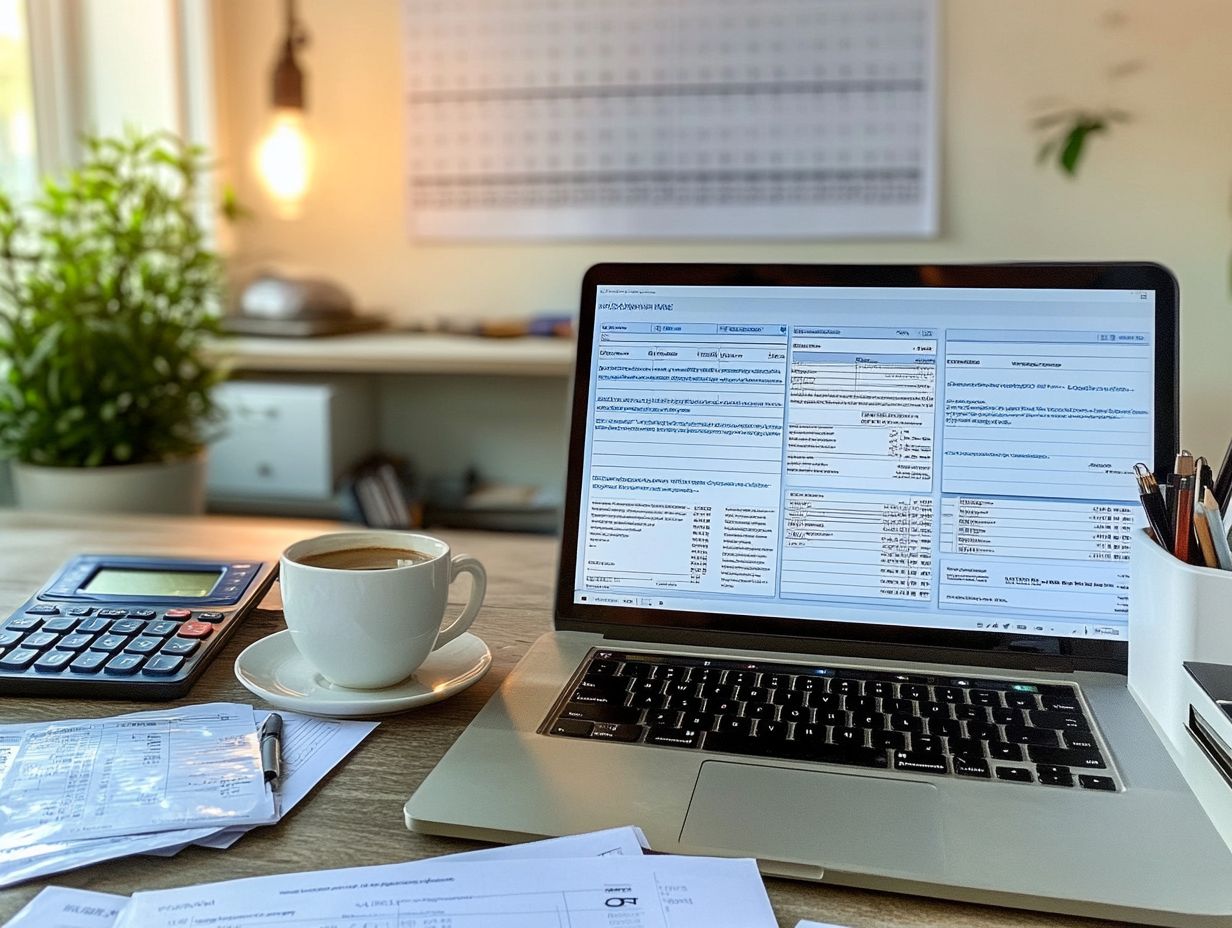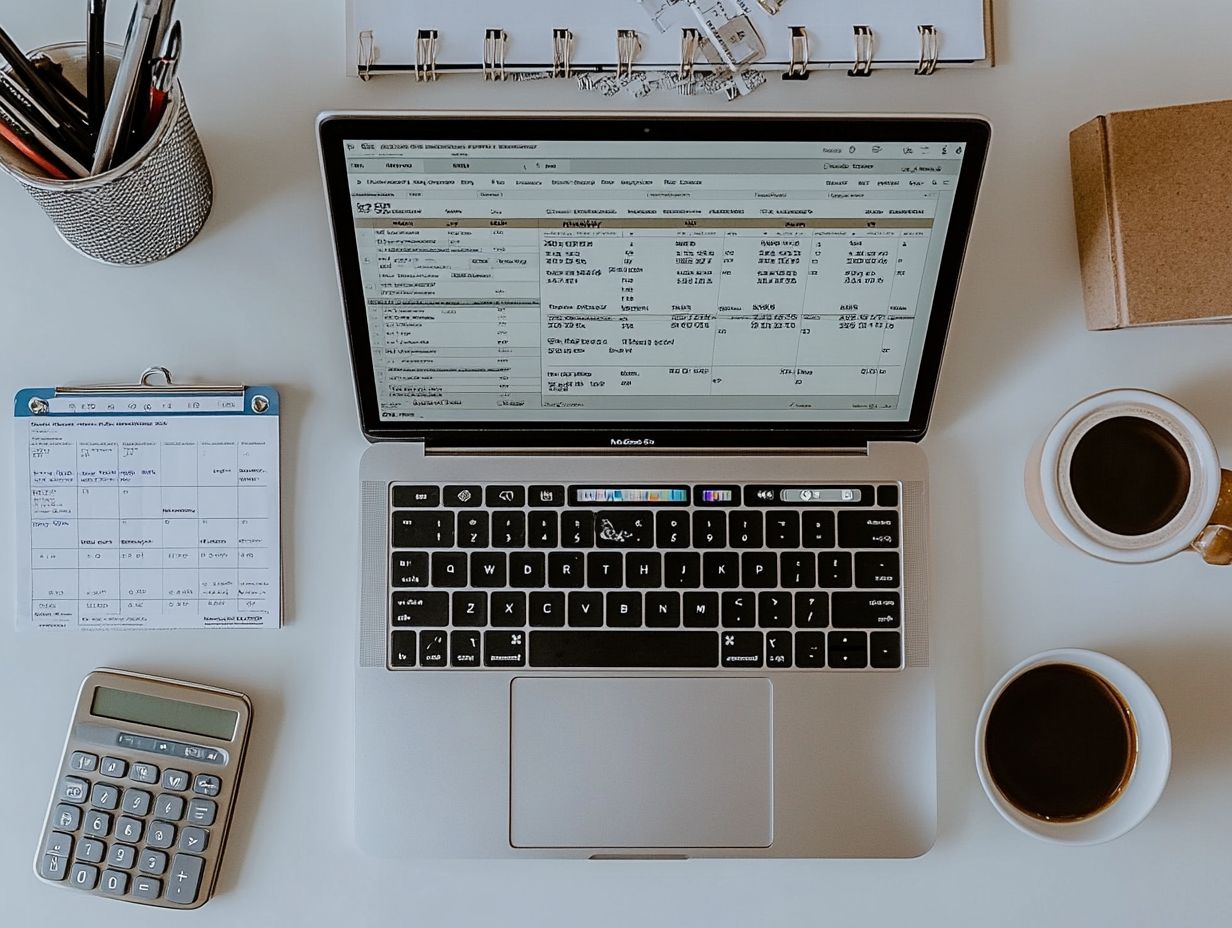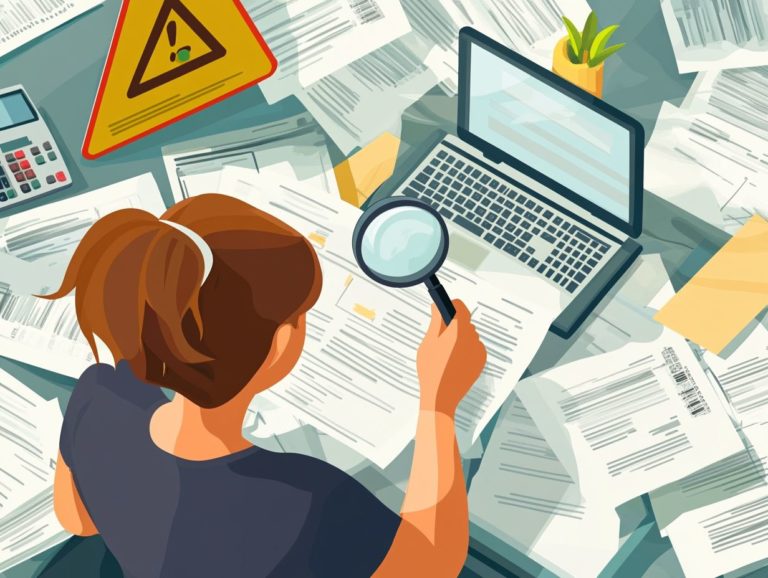How to Prepare for Freelance Tax Season
Freelancers enjoy a unique level of flexibility and independence. However, they also face a distinct set of tax challenges. Understanding their tax obligations is essential for freelancers, as it can help them avoid unpleasant surprises during tax season.
This article outlines key information that every freelancer needs to know, including applicable taxes, important deadlines, and effective financial organization. We will also explore strategies for maximizing deductions and credits, selecting the right forms, and managing taxes throughout the year. This information aims to simplify the tax preparation process and ensure that freelancers retain more of their hard-earned money.
Contents
- Key Takeaways:
- Understanding Tax Obligations for Freelancers
- Organizing Your Finances for Tax Season
- Maximizing Deductions and Credits
- Filing Your Taxes as a Freelancer
- Tips for Managing Your Taxes Throughout the Year
- Frequently Asked Questions
- What is freelance tax season?
- When does freelance tax season occur?
- How should I prepare for freelance tax season?
- Do I need to pay estimated taxes during freelance tax season?
- Are there any deductions or credits that I can claim during freelance tax season?
- What happens if I miss the deadline for filing my taxes during freelance tax season?
Key Takeaways:
- Don’t miss out! Understand your tax obligations as a freelancer, including what taxes to pay and important deadlines to avoid penalties.
- Don’t miss out! Organize your finances by tracking income and expenses and utilizing accounting software to make tax preparation easier.
- Don’t miss out! Maximize deductions and credits by knowing common deductions, such as home office expenses, and taking advantage of tax credits for self-employed individuals.
Understanding Tax Obligations for Freelancers
Understanding tax obligations is vital for freelancers, as they face unique requirements regarding estimated quarterly taxes and self-employment taxes you pay to the IRS, including Social Security taxes and Medicare taxes.
Every freelance worker must be familiar with IRS standards for tax filing and accurately report their business income. They must also understand their financial responsibilities during tax season, ensuring they keep track of personal expenses as well.
Knowing your obligations helps you dodge penalties by the tax deadline on April 15.
What Taxes Do Freelancers Need to Pay?
Freelancers are responsible for self-employment tax, income tax, social security taxes, and Medicare taxes, which collectively contribute significantly to their overall tax liability.
Self-Employment Tax: This tax is essentially a combination of social security and Medicare taxes, with a total rate of 15.3% applied to net earnings. It is a crucial aspect of freelancers’ tax responsibilities that is often overlooked.
Self-Employment Tax vs. Income Tax: The primary distinction between self-employment tax and income tax lies in the fact that self-employment tax is not solely determined by income brackets. Freelancers can calculate their self-employment tax using Schedule SE—a form used to calculate your self-employment tax—on Form 1040.
Expenses for Freelancers: Freelancers can manage their expenses by taking advantage of tax deductions. Common deductible expenses include home office costs, equipment purchases, and business expenses like travel expenses. By diligently tracking these deductible expenses and claiming the available deductions, freelancers can effectively reduce their taxable income.
Important Deadlines to Keep in Mind
Mark your calendars! The April 15 deadline for filing taxes and the quarterly estimated tax payments are crucial for managing earnings and tax liabilities throughout the year. These deadlines help freelancers avoid underpayment penalties and ensure tax compliance.
Freelancers are required to submit their estimated taxes to the IRS every quarter, with payments typically due on April 15, June 15, September 15, and January 15 of the following year. Adhering to these deadlines prevents penalties and ensures they maintain a good standing with tax agencies.
The annual tax filing deadline is also important for reporting total income and claiming deductions. It requires careful attention to ensure compliance with IRS regulations. Understanding these timelines enables freelancers to strategically manage their finances and be adequately prepared during tax season.
Organizing Your Finances for Tax Season
Organizing finances for tax season is crucial for freelancers, as effective bookkeeping simplifies the process of gathering tax-related documents and other financial data. This reduces stress during tax preparation.
Utilizing bookkeeping software can assist in organizing tax documents and ensuring that all financial transactions are accurately recorded throughout the year.
Tracking Income and Expenses
Tracking your income and expenses is crucial as a freelancer. It helps you separate business costs from personal ones and find tax-deductible expenses that lower your tax bill.
Keep a detailed record of all transactions. This way, you can easily distinguish business-related expenses from personal ones.
Pay attention to specific expenses that can boost your profits, such as business mileage for travel related to client projects.
- Office supplies
- Travel costs
- Software subscriptions
Tracking these expenses helps you notice trends in your income and plan your budget, leading to more profitable operations.
Utilizing Accounting Software
Using accounting software like TurboTax or Collective can simplify tax preparation for freelancers. These tools automate bookkeeping, ensuring you collect accurate financial data for tax compliance.
They also make it easy to record income and expenses, providing real-time cash flow insights. This simplifies your financial management.
For example, tools like QuickBooks and FreshBooks offer features that streamline invoicing and expense tracking. They help categorize transactions effectively for tax planning.
These tools send reminders for important tax deadlines. This helps you stay compliant with IRS regulations and reduces stress during tax season.
Maximizing Deductions and Credits
Freelancers can reduce their tax bill by maximizing deductions and credits. Common deductions include the home office deduction and cell phone deduction. Be sure to track these through your financial system.
Common Deductions for Freelancers
Freelancers can claim several deductions to lower their taxable income, like the home office deduction and necessary business expenses. These deductions are great for those working from home or in a small office.
To claim the home office deduction, you must show that part of your home is used regularly and only for business activities.
Other deductible expenses include:
- Equipment purchases
- Travel expenses for client meetings
- Software services
- Courses for skill development
Keeping accurate records is key. Detailed receipts and organized financial statements simplify claiming deductions and provide proof in case of an audit.
Understanding available deductions allows freelancers to maximize their benefits, especially when working with a tax preparer.
Money-Saving Opportunities Available for Freelancers
Freelancers can take advantage of various money-saving opportunities that offer additional savings, helping to reduce their overall tax amount owed in accordance with rules from the IRS. This can be beneficial during tax season. By understanding the range of available tax credits, freelance professionals can significantly improve their financial situation.
For example, educational tax credits, such as the American Opportunity Credit, can support individuals pursuing further education related to their field. This helps enhance their financial situation and overall freelance financial management.
Health care tax credits can help alleviate the burden of insurance premiums. Furthermore, credits for business investments, like the Credit for Small Employer Health Insurance Premiums, encourage healthy workforce practices.
To apply for these credits, freelancers should complete the appropriate forms when filing their taxes and gather necessary documentation. This includes proof of expenses or enrollment in educational programs to ensure they maximize their eligible savings.
Filing Your Taxes as a Freelancer
Freelancers file taxes using several tax forms. The primary form used by freelancers is Form 1040, which serves as the individual income tax return.
To report their business income and expenses, freelancers complete Schedule C, a form where freelancers list their income and expenses. This is filed alongside Form 1040, ensuring compliance with rules from the IRS for accurate reporting.
They also use different 1099 forms, such as Form 1099-NEC and Form 1099-K. The IRS provides a Tax Tip that offers examples of how to report income on Schedule C based on the nature of the business.
Choosing the Right Tax Form
Choosing the right tax form is essential for freelancers. The impact of using appropriate forms, such as Form 1040, Form 1099-NEC, or Form 1099-K, can significantly affect tax reporting and compliance. This ensures accurate and timely tax return submission.
For instance, Form 1099-NEC is primarily used for reporting non-employee compensation. This applies to most freelancers who provide services to clients. Document preparation can ease the stress of tax filing.
In contrast, Form 1099-K is intended for those who receive payments through processors like credit card companies or PayPal. It summarizes payments made to freelancers when the total exceeds $20,000 or when there are more than 200 transactions.
While navigating these forms may seem challenging, individual factors such as total earnings and chosen payment methods play a significant role in determining whether these forms need to be submitted. By assessing their sources of income and referring to IRS guidelines, freelancers can navigate their responsibilities effectively.
Maintaining accurate records for managing both business and personal expenses throughout the year is crucial for compliance. This ensures that freelancers can manage their financial responsibilities without surprises.
Take control of your taxes today and make sure your filing process is as smooth and error-free as possible!
Working with a Tax Professional
A tax professional or tax preparer serves as a valuable partner for freelancers. They help meet IRS requirements and reduce the burdens of tax filing and management. With their expertise and knowledge of constantly changing tax rules, self-employed individuals can greatly benefit from consulting with a financial coach.
Tax professionals enable freelancers to understand what to expect and how to fulfill their obligations properly. They assist freelancers in maximizing deductions related to their work, including the home office deduction and the cell phone deduction, ultimately reducing the overall amount of taxes owed.
Freelancers should seek tax preparers with experience working with self-employed individuals and a solid understanding of the differences between reporting freelance income and W-2 income. Once a tax preparer is chosen, freelancers can expect a thorough discussion of their financial situation, attentive service, and advice that will help them grow their finances while remaining compliant with tax regulations.
Tips for Managing Your Taxes Throughout the Year
Effectively managing your taxes as a freelancer throughout the year is crucial. Maintaining accurate records and staying organized will make tax preparation and filing at the end of the year easier and less stressful.
Your emotional relationship with money affects how freelancers handle their financial responsibilities. Taking financial responsibility is vital for understanding the implications of Social Security taxes, which must be factored into the overall budget freelancers create for their tax obligations. Medicare taxes are another important consideration for freelancers.
Keeping Accurate Records
Freelancers must maintain accurate records to remain organized during tax season. Effectively tracking their income and expenses is essential for making informed decisions regarding deductions and savings. Good bookkeeping facilitates these processes, helping to avoid potential issues when filing taxes.
Utilizing reliable bookkeeping software simplifies this task by providing an organized platform to track income, such as payments from clients, and categorize expenses, including office supplies, internet bills (which may include home internet costs associated with maintaining a home office), and travel costs.
This documentation is essential, as it affects the accuracy and legitimacy of tax filings and significantly reduces the likelihood of audits. Tools like expense tracking apps and digital invoices make it easier and more efficient for freelancers to maintain their records, ultimately saving them time and money.
Setting Aside Money for Taxes
Setting aside money for taxes is not just a task—it’s your key to financial peace of mind! This crucial aspect of financial management for freelancers ensures they can cover income from freelance work to manage their tax liability throughout the year. This practice helps avoid unexpected costs at the end of the year and fosters a sense of financial security.
Budgets serve as a powerful tool for allocating funds for taxes. They enable freelancers to decide what percentage of their income to save. Generally, it is advisable for freelancers to set aside 25-30% of their income. Tax savings strategies include setting aside funds for estimated quarterly taxes, which are crucial for managing a freelancer’s tax obligations and avoiding issues with deductions.
Tracking income and expenses using spreadsheets or financial apps can assist with this process. These tools simplify the determination of these percentages, which is essential for effective budgeting. Additionally, establish a separate savings account for taxes to reduce stress during tax season, potentially resulting in savings through careful planning.
Tracking business mileage deductions is important for freelancers who use their vehicles for work-related tasks. This can help you review your finances more effectively.
Frequently Asked Questions
What is freelance tax season?
Freelance tax season refers to the time of year when self-employed individuals must file their taxes and report their income from freelancing work. It can be overwhelming without a solid plan for document preparation.
When does freelance tax season occur?
Freelance tax season typically runs from January 1st to April 15th of each year. It is crucial to ensure you meet the IRS requirements, with tax returns due on April 15th.
How should I prepare for freelance tax season?
To prepare for freelance tax season, gather all of your income and expense records from the previous year, organize them, and consult with a tax professional if needed.
Do I need to pay estimated taxes during freelance tax season?
If you expect to owe more than $1,000 in taxes for the year, you are required to make quarterly estimated tax payments throughout the year.
Are there any deductions or credits that I can claim during freelance tax season?
As a self-employed individual, you may be able to claim deductions for business expenses such as office supplies, home office expenses, and health insurance premiums. You may also be eligible for tax credits such as the Earned Income Tax Credit or the Self-Employment Tax Deduction.
What happens if I miss the deadline for filing my taxes during freelance tax season?
If you miss the deadline for filing your taxes, you may be subject to penalties and interest on any taxes that you owe. It is important to file for an extension or pay any taxes owed as soon as possible to avoid these penalties.










